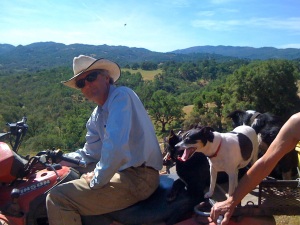Today’s Blog Post is about Mac Magruder and his ranch, Magruder Ranch. Mac and his family have been providing us with beef and pork from his AMAZING property in Potter Valley. We extended our definition of “Local” to mean within 150 miles of Berkeley so that we could include his products. Below the interview, I have posted some photos of the farm. We asked Mac a few questions and here are his answers:
TLBS: When did you start doing what you are doing now and how is it that you find yourself doing what you are doing?
I was born in 1949 and became the fourth generation to shape our family’s property in Potter Valley, a rural hamlet in Mendocino County, California. This region
(home for thousands of years to the Pomo Indians), was settled by European
Americans in the mid-1800s. These newcomers were predominantly farmers who introduced a variety of livestock that thrived on the landscape of oak-studded hills and rich river valleys.My grandparents raised sheep on the 2300 acres they called Ingel-Haven Ranch; my father farmed pears and cattle. I grew up helping on the ranch, but went away to study ceramic sculpture in college and graduate school. In the late 1970s my father fell ill and I returned to Potter Valley to take over management of the ranch. I removed the pears (which had always been marginally economically viable) and began to focus exclusively on a cow/calf operation, something I felt the land was especially suited for.
It was a frustrating time. Since the advent of feedlots in the 1950s, the cattle raised
on the ranch were all shipped out of the area to be fattened elsewhere. After months of raising animals with painstaking care, I would have to send them off to a feedlot, losing control of my product and subjected each year to the whims of the national market.Finally, in the early ‘80s, I discovered Holistic Resource Management, a workshop for innovative ranchers run by Stan Parsons. Parsons emphasized the importance of keeping overhead costs down (resist the big new machines) and focusing instead on using natural energy: sunlight rather than processed energy.
During the past thirty years I have become, in effect, a grass farmer, developing fertile pastures rich with naturally growing legumes and grasses perfectly suited to grow healthy cattle. Ingel-Haven Ranch consists of both irrigated pastures and open-hill land, which provides year-round grazing for the cattle in a holistic rotational system. The land is grazed and then rested an optimal amount of time for proper plant recovery.
TLBS: What’s your favorite thing about your job?
Knowing our business is doing good in the world. When I sell meat to a customer, I’m strengthening our local/regional economy; providing people with good, healthy food; supporting our family business and right livelihoods; preserving and enhancing our land; building soil and sequestering carbon; strengthening a longterm relationship with a customer and almost always a friend.
TLBS: What’s your least favorite thing about your job?
Saying goodbye to the pigs when they go to market. We love them so much!
TLBS: What about your farm, product or practices that make you unique?
We’ve been at this for a long-time (30 years grass-fed beef, 90 years as a family ag business), so we’ve got it down pretty well. We only finish animals on fresh, growing grass
(no hay, dry feed, and of course, grain). We use special genetics that we’ve cultivated for decades to produce cattle that fatten and marble on grass exceptionally well. We are very close to a zero input, closed-loop operation; using water, sunlight, and grass to produce all of our feed (including making all of our own hay for winter), soil fertility (nitrogen fixing legumes, manure, and root growth), and animals (including our own breeding stock). We truly are making a living off the land (and not fossil fuels). Think of us as a 2400 acre solar-to-food converter, but without the government subsidies.
TLBS: What piece of wisdom would you like to pass on to our customers?
Eat more pasture-raised meats! Really. They’re actually healthy for you. They have the same health benefits as fish (omega-3s!) but without the baggage of over-fishing and mercury poisoning. And when it comes to meat, ALWAYS know who and where it comes from. Meat can either be really bad (CAFOs, pollution, animal suffering, corn monoculture, fossil fuel & carbon intensive, unhealthy and tasteless), or really good (see above). We invite you to visit our Ranch, as a we have nothing to hide (call Ben @ 919.414.9969 for a tour).
TLBS: Your stats?
Favorite Ice Cream Flavor: Chocolate Chip Cookie Dough
Favorite Color: Green
Favorite Cuisine: Southern Cookin’; especially North Carolina BBQ
Dogs or Cats? I love both
Astrological Sign: Leo
[slideshow]


This website was… how do I say it? Relevant!! Finally
I have found something that helped me. Thank you!